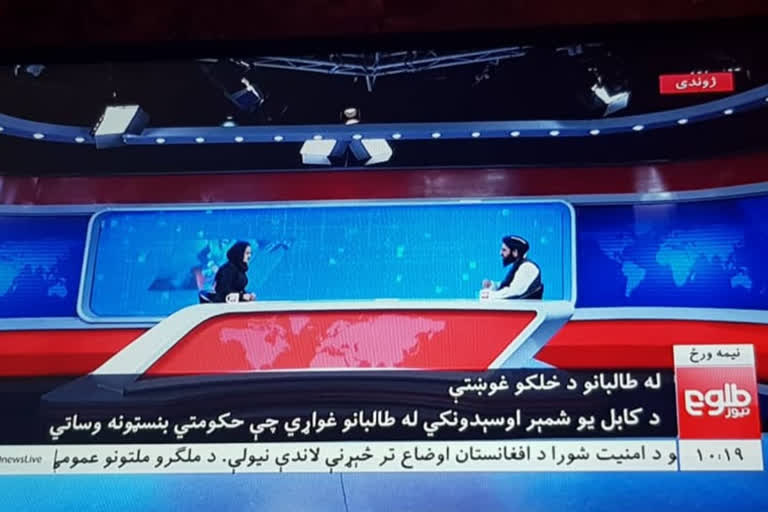Hyderabad: Amid widespread apprehensions of repression of women and girls by the Taliban after assuming power in Afghanistan, it seems the fundamentalist outfit is trying to shed this image and allay such fears.
After the Taliban stormed Afghanistan's capital Kabul Sunday and captured it, a female TV presenter was seen interviewing a media team member of the insurgent group on a local news channel.
“Our female presenter is interviewing a Taliban media team member live in our studio @TOLOnews #Afghanistan,” Miraqa Popal, head of news at Tolo News, tweeted sharing pictures of the interview inside the studio.
Meanwhile, Enamullah Samangani, member of the Taliban's cultural commission, announced an amnesty Tuesday on Afghan state television and urged women to join the government.
“The Islamic Emirate don’t want women to be victims,” AP quoted Samangani as saying. “The structure of government is not fully clear, but based on experience, there should be a fully Islamic leadership and all sides should join.”
Also read:Taliban can't be trusted, they will show their real face soon, say Afghan refugees
When the Taliban ran their first government in Afghanistan from 1996 to 2001, they became internationally notorious for their misogyny and violence against women. Their stated motive was to create a "secure environment where the chastity and dignity of women may once again be sacrosanct", reportedly based on Pashtunwali beliefs about living in purdah.
Women in Afghanistan were forced to wear the burqa at all times in public, because, according to one Taliban spokesman, "the face of a woman is a source of corruption" for men not related to them. In a systematic segregation sometimes referred to as gender apartheid, women were not allowed to work, they were not allowed to be educated after the age of eight, and until then were permitted only to study the Quran.
Women were banned from riding bicycles or motorcycles, even with their mahrams or family members. In taxis, women were forbidden to ride without a mahram. Segregated bus services were introduced to prevent males and females travelling on the same bus.
In hospitals, male doctors were not allowed to treat female patients as a result of which women had to traverse long distances for their health care needs.
Also read:Taliban seizes Kunduz; issues regressive decrees for women
Now, with the Taliban sweeping into power again, chaos and panic continue in Afghanistan as civilians have started fleeing from that country.
Despite Samangani's statements allaying the fears of women and the Tolo News interview, the Taliban will still have a lot of convincing to do.
Adiba, for one, an Afghan national living in Delhi since 2019, is one such person who will not be easily convinced.
Recalling past experiences, Adiba told ETV Bharat that the Taliban are clever and will do certain things to be accepted by some governments and the United Nations and "then they will show their real face”.
